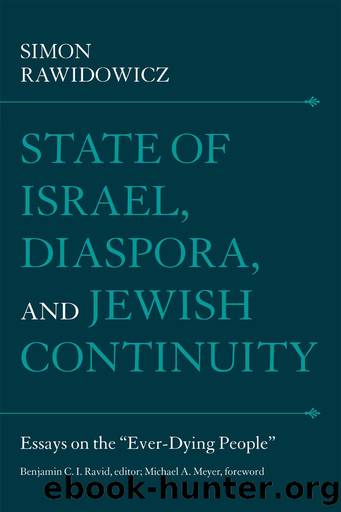State of Israel, Diaspora, and Jewish Continuity by Simon Rawidowicz

Author:Simon Rawidowicz [Rawidowicz, Simon]
Language: eng
Format: epub
ISBN: 9780874518467
Barnesnoble:
Publisher: Brandeis University Press
Published: 1998-01-01T00:00:00+00:00
Two That Are One*1
1
It is indeed a great joy for me to participate in this Zukunft Symposium together with the first ambassador of the State of Israel to the United States, Mr. Eliahu Epstein [Elath], whom you have so cordially received today, and with our great poet, Mr. Leivick, who has just reached the age of sixty, and whom we all wish many years of creativity. To the Greeks, the word symposium meant simply a meal; for us it is a meal with divre torah, words of Torah, almost a ritual meal. Generally, most speeches at symposia conform to the biblical verse âand the one came not near the other all nightâ [Exodus 14:20] but I feel that it will be different tonight. I permit myself to predict that we will be fundamentally three that are one. . . .
Three people speaking about one problem; three, notice, not the Four Sons of the Haggadah, God forbid. A Jew is by nature full of associations, and a number recalls for us all sorts of numbers from long ago. The number three evokes so many threes in our past. And so, while traveling here through the night from Chicago to New York, so many threes came before my eyes, until I stopped at the tripartite division of our Rosh Hashanah musaf service: malkhuyot [the section that asserts Godâs kingdom over man], zikhronot [the section evoking memories] and shofrot [the section relating to the shofar]. It became clear to me that that was it: I was traveling to take part in a musaf service, which was called in the vernacular a âsymposium.â It is not quite proper, a little too late for musaf, but you are, my friends, attending a kind of Rosh Hashanah musaf.
The evening began with the representative of malkhuyot: âAnd there was a king in Jeshurun,â a new Jeshurun, a new king, and, of course, a strictly democratic âkingdom.â If Mr. Epstein is malkhuyot, then Mr. Leivick is certainly shofrot, for who could be closer to shofrot than a poet? Who hears more than the poet the eternal call: âSet the horn to thy mouthâ [Hosea 8:5]? Therefore, it must fall to me, placed between malkhuyot and shofrot, to be zikhronot, remembrance.
Between our speaking about malkhuyot and our blowing of the shofar, I will engage in remembering. Israel has always been a people of memory. Jews even demanded of their God that He have a memory. We say in our Rosh Hashanah service: âAnd you shall remember the covenantâ; we remember, therefore, He too should remember. Modern Jewry, or certain elements within it, have revolted against the very concept of remembering, wanting to free us of our memories. New malkhuyot, new shofrot, a new world, a new Jewish people: these have become great slogans with different nuances in different camps.
2
Memories: what do they teach us? A great secret, the secret of the survival of the Jewish people, the first people in the world, if I am not mistaken, to discover
Download
This site does not store any files on its server. We only index and link to content provided by other sites. Please contact the content providers to delete copyright contents if any and email us, we'll remove relevant links or contents immediately.
| Bahrain | Egypt |
| Iran | Iraq |
| Israel & Palestine | Jordan |
| Kuwait | Lebanon |
| Oman | Qatar |
| Saudi Arabia | Syria |
| Turkey | United Arab Emirates |
| Yemen |
Empire of the Sikhs by Patwant Singh(23072)
The Wind in My Hair by Masih Alinejad(5091)
Rise and Kill First by Ronen Bergman(4779)
The Templars by Dan Jones(4682)
The Rape of Nanking by Iris Chang(4203)
12 Strong by Doug Stanton(3541)
Blood and Sand by Alex Von Tunzelmann(3195)
Babylon's Ark by Lawrence Anthony(2671)
The History of Jihad: From Muhammad to ISIS by Spencer Robert(2619)
No Room for Small Dreams by Shimon Peres(2365)
The Turkish Psychedelic Explosion by Daniel Spicer(2353)
Inside the Middle East by Avi Melamed(2350)
Gideon's Spies: The Secret History of the Mossad by Gordon Thomas(2337)
Arabs by Eugene Rogan(2292)
The First Muslim The Story of Muhammad by Lesley Hazleton(2267)
Come, Tell Me How You Live by Mallowan Agatha Christie(2253)
Bus on Jaffa Road by Mike Kelly(2150)
Kabul 1841-42: Battle Story by Edmund Yorke(2025)
1453 by Roger Crowley(2022)
